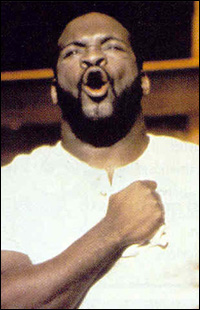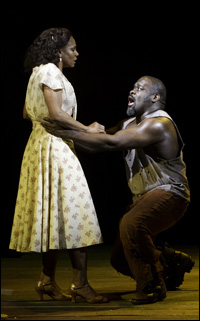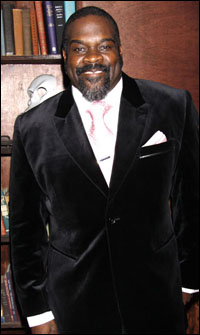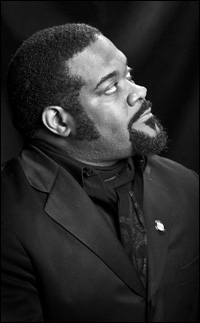
*
Phillip Boykin is a natural-born Catfish Row resident, having grown up in Greenville, SC, 102.5 miles from that Charleston enclave. On seven different occasions since 1996 he has made himself right at home in the musical neighborhood immortalized by author DuBose Heyward. His latest residency begin Jan. 12 as The Gershwins' Porgy and Bess moved into the Richard Rodgers Theatre on Broadway.
These days you'll find him lording heavily over that mythic community as Crown, the murderous disruption in the already complicated relationship of the "crippled" Porgy (Norm Lewis) and the promiscuous Bess (Audra McDonald). All three corners of that triangle are currently raking in Tony votes.
Not only that, Boykin is one of three performers — Tracie Bennett in End of the Rainbow and Jeremy Jordan in Newsies are the other two — who are up for 2011-2012 awards from the Drama Desk, the Outer Critics Circle as well as the Tonys, and have already won Theatre World Awards for their first year on Broadway.
Boykin was not always snarling out Crown in his best bass-baritone. When he first entered Catfish Row years ago, what he had in mind was Porgy, but that role was already taken — by the director, Larry Marshall, who suggested that more seasoning was needed for the 24-year-old applicant and rerouted him to be the Crown understudy. Working his way up to full Crown volume, Boykin bided his time with lesser Catfish Row denizens, most of whom have disappeared or been diminished in the Suzan-Lori Parks/Diedre L. Murray adaptation that director Diane Paulus has delivered to Broadway (earning ten 2012 Tony nominations): Jim, the cotton picker whose main plot function is to introduce the cotton hook that Crown uses to kill Robbins; Frazier, the "lawyer" whose bogus hocus-pocus dissolving Crown's marriage to Bess becomes a shtick for matriarch Maria; Jake, the fishing-boat owner; and a fisherman, Nelson, who never made this voyage.
| |
 |
|
| Boykin in Show Boat. | ||
| photo by Carol Rosegg |
"I've done a lot of operas," Boykin proudly asserts. "I've played Tarquinius in The Rape of Lucretia. I've done Don Alfonso in Cosi fan Tutte, Turandot, Rigoletto. Most of the reporters list me as an opera star."
Do you like "opera star," or do you like your new listing, Broadway actor?
Phillip Boykin: I like entertainment. My email address is theboykinentertain so I can do both opera and musical theatre. I've done an equal amount of both.
Your background is the operatic Porgy and Bess. What do you call the version you're doing now?
PB: Our show? I like to call it the Broadway version of Porgy and Bess. Larry [Marshall] said, "It's like apples and oranges." The opera is the opera — and it's still performed everywhere — and this is the musical-theatre version of the opera.
Going from the opera version of Porgy to the musical-theatre version, you presumably had no "purist" problem.
PB: Well, actually, I did. I had a slight problem. When I first heard they were turning it into a musical-theatre piece, I couldn't see how that would work. It's one of the greatest American operas there is. It's a masterpiece. I just never considered it being a musical-theatre piece. But after we did the workshop and after we did more than 50 performances up at Cambridge, I was able to see that this version is just a different animal. The opera is still around. We're not trying to get rid of the opera at all. In fact, there's no way you ever could. We're just trying to make the story more accessible to audiences and to present the characters as real humans with real emotions.
| |
 |
|
| Boykin with Audra McDonald in The Gershwins' Porgy and Bess. | ||
| Photo by Michael J. Lutch |
PB: I had to connect Crown to someone I knew growing up in the poorest part of Greenville, SC. He was one of those guys you never knew which way he was going to be on any given day. He would fight for you, or he would fight you, you just never knew. When you add the element of alcohol or drugs to the mix, he would fight everybody. That's who I thought of Crown as being. I didn't want to judge him. He was a real person, just trying to live his life.
What kinds of audience reactions do you get?
PB: Every time I come out on stage, I can see people cover their mouths, or I can hear them gasp for air and moan "Oh, no! Not Crown again!" That's every night.
What Crowns do you admire?
PB: Gregg Baker, who was in the Trevor Nunn version shown on PBS. I got to meet him later in New Jersey at Symphony Hall when he was playing his first Porgy. He towered over me. I don't look up to too many people because of my height, but he is 6-foot-7 or something like that.
Lester Lynch is another Crown that I really enjoyed, but the one that I understudied — who, in my mind, is Crown — is Stephen Finch. When you look at him, you can see how he could play Crown easily — and he does. He's played it all over the world. He was the first Crown I saw who could act the part just as well as he could sing it.
Since you had already played Crown so many times, did you bring your thoughts to the table, or were these new creators not interested in your views?
PB: Oh, they were very interested in what I had to say. The role of Crown didn't change that much. The only change that was made is that all of his scenes are much smaller, more condensed. The Kittiwah [Island] scene is about twice as long in the opera than it is in the Broadway show. The hurricane scene is much shorter. Crown only sings about four verses of "A Red Headed Woman." Originally, we tried to change it to "A Red Dressing Woman," but in the end they decided to keep it the way it was.
| |
 |
|
| Boykin on opening night | ||
| photo by Joseph Marzullo/WENN |
PB: That is all organic. Diane Paulus and Audra and I felt free to explore what this scene was going to be. We would do the lines, and I would say, "I think the character would do this or go after her here." And Audra did the same. That's what the three of us came up with. There was no fight choreographer or anything. I just did what I felt Crown would do.
Has anything dangerous happened to either one of you while you're doing that scene?
PB: Not in that scene, but in the fight with Porgy. Porgy has to hit my leg with his cane, and, so far, he has broken seven canes on my right leg — seven of them.
Jeez! You must tell Norm Lewis not to overact!
PB: One night, the knife he's supposed to kill me with skittered into the orchestra pit.
How did you die that night?
PB: He was hitting me with the cane, so I grabbed the cane and pulled it to my neck, and he choked me that way.
| |
 |
|
| Boykin at the Tony Award nominee reception | ||
| Photo by Monica Simoes |
PB: Yes, yes, yes. I got my bachelor's degree from the Hartt School of Music [in New England], and every year, for summer breaks, I would fly back to South Carolina. As soon as I got off the plane, I could not breathe. The air was so thick. I would always have to give myself a week to adjust to the new climate. In this show, I recall those feelings. I think that's why we talk really slow — the people from South Carolina. It's just too hot to talk fast.
How important is it to be a Broadway actor now than just being an opera singer who is known for opera credits?
PB: As I've said, I've done a lot of musical theatre. In fact, I started with a group called The Phillis Wheatley Repertory Theatre for Youth in Greenville, SC — and I had dreams of performing on Broadway. That's what I wanted to do. Because of the natural talents I was given by The Maker, I have a large voice. My chorus teachers encouraged me to sing operatically, and so I did. I pursued a lot of opera roles and, at the same time, did a lot of musical theatre.
Did you have a preference, growing up?
PB: My preference was to be a gospel singer. I went to church. My birth father was a minister so I was in church every time the doors opened. The stars I saw at that age were the soloists at the church so I wanted to be a gospel singer. I remember my adopted father telling me, "You don't have that kind of voice." Michael Rice from the Greenville Fine Arts Center agreed with him. He said, "Use that instrument to the full volume, with the technique opera singers use." Eventually, I realized they were right. I have a more operatic-sounding voice — although I still sing gospel and pop.
The operatic voice has taken me to many places all around the world. I've been all over Europe. I've been to Russia and Poland. I've been to Japan and New Zealand and Australia, everywhere — mostly with Porgy and Bess. I have six brothers and three sisters. None are singers. Not one. I used to feel guilty, traveling all over the world, seeing these beautiful places and expanding my horizons and thinking about them not even wanting that. It's not something they'd just even consider.
Where were you when you heard about your Tony nomination, and were you anticipating that at all?
PB: I was sitting on my couch watching a morning news show, and they were announcing the nominees — but they only did a few categories, and that was it. They went back to the anchor people so I ran to my laptop and turned it on. About ten minutes later, I got to the Tony Awards website. Since no one called, I assumed I wasn't nominated so I just sat back and watched the video on Tony Awards.com and, when they got to the category and said my name, my mouth flew open. I started shaking. All over, I was shaking. My dream was to be on Broadway, and, when I got on Broadway I was in heaven. Then come these nominations. I'm still floating. It still hasn't hit me.
I tell kids at the stage door all the time never to give up, and, once you seem to have accomplished your dream, make another dream. Never stop dreaming because if you stop dreaming you can get complacent and you'll be stuck in one place — although, I must say, Broadway is a pretty wonderful place to be stuck in.
View highlights from the show:









